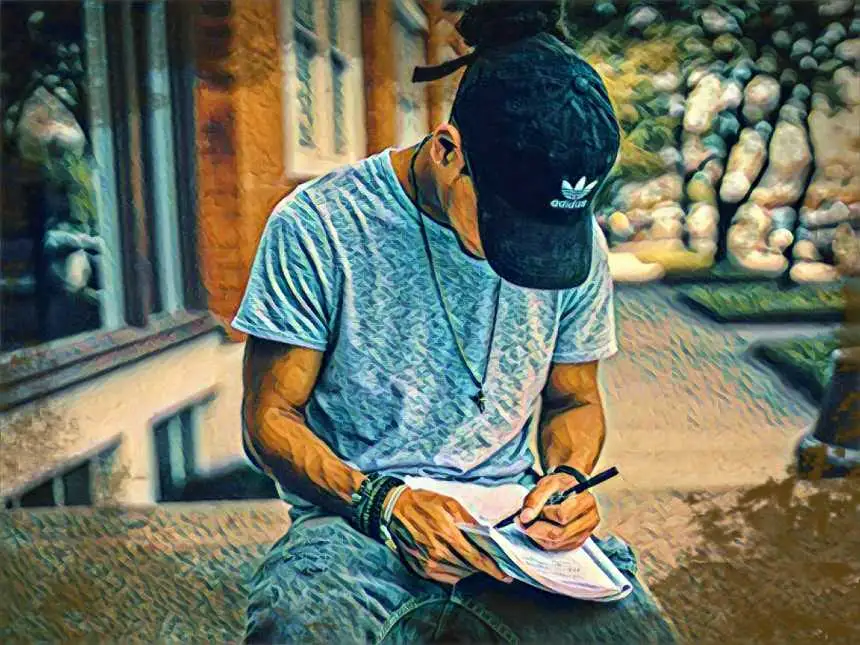Learning how to write song lyrics is an essential skill for every musician. After all, song lyrics are one of the central components of the connection between the listener and an artist. A track with great song lyrics is simply irresistible since it makes it easy for just about anyone to step into your sonic world.
However, lyric writing isn't a cut-and-dry process. Your favorite songs make writing lyrics seem easy, but don't forget that every great lyricist started from somewhere. It can be overwhelming to write lyrics for the first time, but thankfully, we'll outline exactly how to write song lyrics below so that you can write a great song by the end of this article. Let's dive into it!
How To Write Song Lyrics For Beginners
The best way to learn how to write a song is to start building lyrics! Here is a step-by-step guide to how you can write your own songs for beginners and experienced musicians alike.
- Determine your lyrical goals.
- Identify your starting point.
- Have a brainstorming session.
- Decide on your song structure.
- Create phrases within your structure.
- Make sure your story has an arc.
- Put your lyrics to the melody.
- Fine-tune for singing ability and catchiness.
- Rinse and repeat!
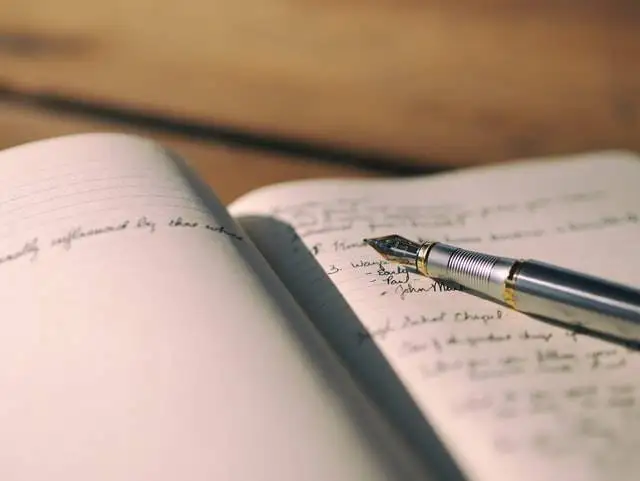
Lyrics transform elevator music into an in-depth art form. While plenty of people can connect with instrumentals alone, strong lyrical content will make it a lot easier for your songs to reach your intended audience. Writing song lyrics isn't always easy, but this outline should make it easy for you to kick off the process.
1. Determine your lyrical goals.
Before putting pen to paper, it can be helpful to determine the goals of your songwriting process for any particular track. You might want to think about exactly what you're trying to say with your own lyrics, or perhaps think of a couple of topics that naturally spark inspiration for you.
Also, think about who the speaker is in your track. Are you writing directly to the listener? Is your song more of an emotional monologue? Or simply a narration of a story or experience? Jot down broad song ideas that you'd like to write about and frame yourself around the most compelling option. Who knows, these initial words of inspiration could serve as a good song title down the line!
The most important part of the task here is to get started. If you can take this small step of narrowing down your thoughts to a single lyrical concept, you'll be well on your way to writing a full page of lyrics . Sometimes, we become too overwhelmed by subject matter that we absolve to writing nothing at all, so taking the time to identify your intentions for the track will undoubtedly put you on the path to success.
2. Identify your starting point.
Songwriting isn't a linear process. In some sessions, the second chorus might be the first thing you write. In others, you might have a more chronological approach, starting with the initial verse and progressing to a pre-chorus and chorus. Before you start writing, allow yourself to be fluid.
Your lyric writing and song structure are bound to go through several iterations before you've created the best lyrics for the track anyway, so don't stress about finding the right word just yet. Let yourself start wide open and trust that you'll edit as needed later on in the process.
If you participate in other art forms within music, you might find lyrics after creating a beat or writing a melody line on your guitar. These are all valid ways to coax your intuitive lyric writing skills out of you, so don't be afraid to use them!
Chord progressions can also help you get inspired, as some artists may prefer to craft lyrics and melody at the same time. Other songs may be created by starting with lyrics alone. Whatever it may be, be confident in your own style and pursue it. The best songs are made by artists who are willing to adapt their process to the needs of the track.
3. Have a brainstorming session.
Once you have your starting point and song topic in place, start your brainstorm! Take out a pad and paper or jot down in your phone anything that you can think of that relates to your song. You could also record your ideas over voice memos or discuss ideas with a creative collaborator. This could be words, melodic phrases, or even full song sentences. This isn't the time to be super stringent, let it all out!
Try not to get in your own way. If you're unsure whether your idea will end up in your final song lyrics, write it down anyway. You want to have as large of a brainstorm as possible so that you can widdle away a full song moving forward.
If you're really struggling to get inspired, listen to different songs that relate to your songwriting topic. Are there any particular parts that resonate with you? Figure out how you can communicate those points in your own words and perspective and write it down.
Don't let great be the enemy of good. Even the best songwriters have writer's block at some point in their careers. The key is to work through it and not give up. You will be able to write a song if you're willing to set aside your fears and let your innate creativity shine through. It's natural to be nervous if you haven't tried to write a song in the past, but don't let this feeling prevent you from writing to begin with. Set your sights on a lyrical goal and go from there.
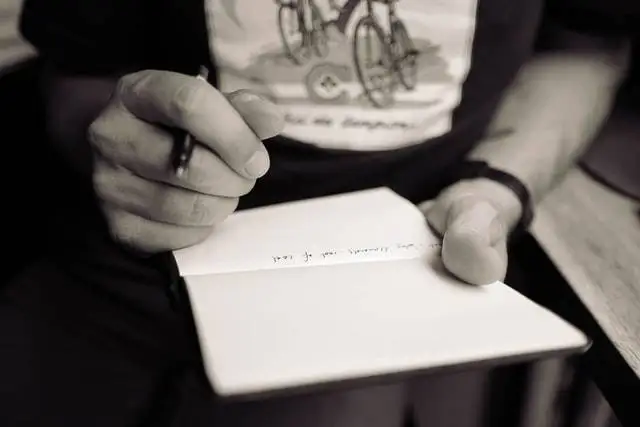
4. Decide on your song structure.
In order to write song lyrics that make sense rhythmically and melodically, you need to understand basic song structures . Determine which words or phrases you want to use in your chorus melody versus your first verse, bridge, pre-chorus, etc. Generally speaking, the most popular song structures are:
- VERSE – CHORUS – VERSE – CHORUS
- INTRO – VERSE – CHORUS – VERSE – BRIDGE – CHORUS
- VERSE – CHORUS – BRIDGE – CHORUS
While many songs stray away from these formulas, it may be best to stick to one of these tried and true song structures while you're getting the hang of the songwriting process. The important step here is that you're grouping your brainstormed thoughts into their own subsections which will be developed into central parts of your song in time.
Some essential parts you'll want to pay attention to include:
- The hook: The hook is a short musical phrase that often shows up within a chorus. Hooks are memorable, catchy, and encompass the song's sentiment within a couple of words.
- The chorus: This is likely the catchiest section in your song, so the lyrics need to be easy to grab on to. Chorus lines repeat themselves throughout the song, so focus on writing chorus lyrics that are easy for anyone to remember.
- The song title: The song title will draw in your listener to listen to the song in the first place, so you'll want to make sure your lyrics match the title's central concept. It's also a good idea to incorporate the song's title within your hook or chorus lyrics.
Note that all components of a song are important. However, when writing song lyrics for a hook, chorus, or title, you'll need to put in some extra time and attention. These sections of a song are probably the most likely to stay with listeners, so make sure that you write a song that highlights these sections as a strength.
5. Create phrases within your structure and a solid rhyme scheme.
Now that you have a general roadmap of where you want to place certain lyrics, it's time to create lyrical phrases if you haven't already. Think about the flow and cadence of your lyrical lines: Each line should ideally have a similar amount of syllables and cadence as the line before it, just as you would with a poem.
This is also a good time to pull out your rhyming dictionary. It's a lot easier to make a song lyrically cohesive if you're employing a rhyme scheme. Rhyme schemes are essential patterns of rhyme. Here are some of the most common rhyme schemes to consider in your songs. Note that the letters denote matching pairs of rhyme so line "A" would rhyme with another "A" line, "B" would rhyme with another "B" line.
AAAA - All lines rhyme. An example might be,
"I fell in love with you (A)
Until I was black and blue (A)
The fall came all too soon (A)
But this is nothing new (A) "
ABAB - The 1st and 3rd lines rhyme and the 2nd and 4th lines rhyme. This pattern is continuous throughout a song. An example might be,
"I fell in love with you (A)
Until I forgot my name (B)
You turned me black and blue (A)
And I welcomed all the pain (B)"
AABB - The first two lines rhyme and the 3rd and 4th lines rhyme. This pattern emphasizes pairs of couplets. A basic example might be,
"I fell in love with you (A)
I set my hopes too soon. (A)
You made a mess of me (B)
Counting on the day you'd leave. (B)"
As you can see, not all corresponding rhyme schemes utilize the same type of rhyme. You can have an exact rhyme (for example, the words "you" and "blue), or utilize a more subtle internal rhyme (like "name" and "pain").
These rhyme types can work all the same, the important point is that you decide on a structure that makes sense for your song. Use your brainstorm to create phrases within a rhyme and song structure and you'll start to see your song start to really take form.

6. Make sure your story has an arc.
Now that you have a basic song structure, make sure your lyrics convey a story arc. Are your lyrics building tension? Are they telling a story that easily guides a listener from one point to the next? Any great song should have a clear beginning, middle, and end. Your lyrics should be memorable and easy to understand.
Scan your verse, chorus, and bridge : Are they all working independently and as a single unit? If not, it may be time to refine your sections as needed. Analyze lyrics that stick with you as a listener: What about them is emotionally impactful? Taking the time to analyze through your listener lens can certainly make it easier for you as a writer.
7. Put your lyrics to the melody.
Once you have your first full draft of lyrics down, it's time to start putting them into melodies if you haven't already. If you're a musician, it can be helpful to loop a chord progression on your instrument of choice to start inspiring some note combinations. You can also try writing melodies on your instrument first and then transferring them to your lyrics.
If you don't play an instrument, it's a great idea to collaborate with someone who does! Worst case, you can always look up a chord progression loop online and start to create a melody line over it. This process will be fairly intuitive, so don't let it intimidate you. Plenty of famous melody lines only incorporate a handful of notes: It certainly doesn't have to be complicated to be effective.
8. Fine-tune for singing ability and catchiness.
The first verse you create may not be the best one. Before you finalize your song, take the time to edit it! Are your consonant sounds at convenient places? Is the chorus truly catchy? Are the words easy for most people to sing and remember? Don't be afraid to rewrite sections during this stage in the process. Sometimes in music, you have to kill your darlings to get the most out of your song.
9. Rinse and repeat!
Without a doubt, the best way to become a great songwriter is to write songs as much as possible. Plenty of songwriters find the time to write multiple songs a week, and you can too! You might not be writing songs on a daily basis at first, but if you challenge yourself with writing goals and trust your instincts, songwriting will certainly become easier over time.
The hardest part of the songwriting process is learning the writing process itself. Crafting your own songs will become more and more second nature. For some, it may be helpful to set certain goals: You might find it easier to motivate yourself to write music if you're trying to write a certain amount of songs per month, etc.
Spend time with other writers to discuss lyric strategy and of course, don't be afraid to collaborate! Some of your favorite songs on the radio today were surprisingly written by 5+ people. When it comes to songwriting, two heads can often be better than one.
At the end of the day, don't get discouraged if you're not loving your lyrics at first. Most songs go through multiple iterations before they are properly distributed to listeners. For every killer song recorded, there are about 20 "eh" songs that didn't quite make it, and that's okay. In fact, that's normal! Give yourself a pat on the back for writing your first song and swiftly move on to the next one.
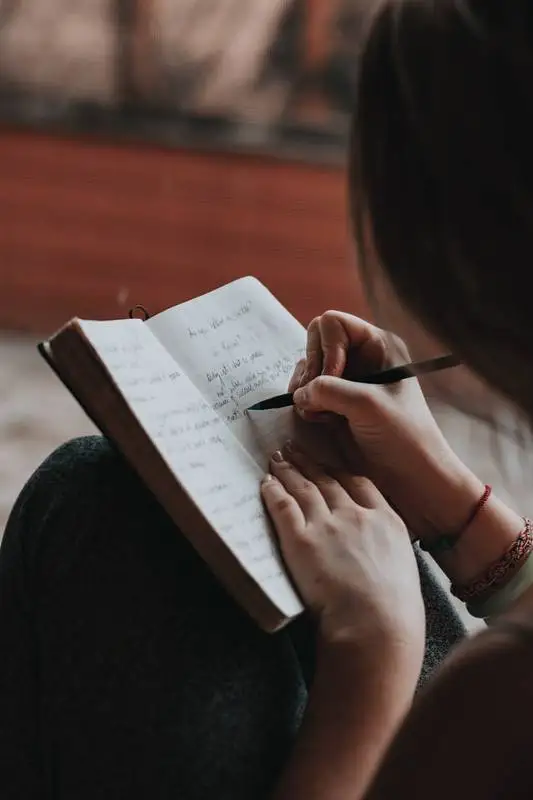
Tips For Writing Song Lyrics
Writing songs can be incredibly difficult, so here's a couple of tips to keep in mind throughout your journey as a songwriter. Don't forget that crafting good song lyrics can take time, but with these pointers and practice, you're sure to write radio-ready hits in no time at all.
Remember That This Isn't Always A Linear Process
This songwriting guide should be taken with a grain of salt. There isn't one way to start writing lyrics, so don't be deterred if your natural writing process doesn't fit neatly within any particular outline. The most important part of songwriting is the outcome: If you're finishing songs, that's all that matters.
On some tracks, you may start with a melody, on others, it might be a lyrical phrase. Sometimes you might use tools like songwriting books to spark creativity, other times a song will flow out of you without issue. Trust the process in any way that it comes to you.
Instrumentalists and Songwriters Wear Different Hats
Even if you're a great instrumentalist, producer, or engineer, you aren't necessarily a great songwriter, at least not yet. Keep in mind that each aspect of music-making requires you to wear different hats. The skills you bring to one area may not translate to another, but don't let that deter you.
Instead, use this nugget to give you some perspective: Learning how to write song lyrics takes time and its own attention, that's why there are sectors in the music industry dedicated exclusively to this art. You might already be musical, but that doesn't necessarily mean you've learned how to write lyrics (but there's nothing stopping you from getting started).
Record Sparks Of Inspiration And Save Them For Later
As a musician will tell you, inspiration can strike at any moment. Whether you're in the shower, settling down for bed, or at work, make sure you don't take these spontaneous bursts for granted. Make a habit of recording these inspirations and revisiting them later.
You could write them down on a sticky note, record a voice memo to yourself, or even text or email yourself something you can open during your next songwriting session. Inspiration isn't always convenient, but many songwriters are able to capture these moments and harness their power down the line.
Don't Be Too Hard On Yourself
One of the best ways to get past writer's block is to cut yourself some slack. So often, we want so badly to emulate the style of one of our favorite lyric writers or come up with great songs on the spot that we distract ourselves from actually writing songs. Sometimes, it can be helpful to just let yourself write!
This means saving the "critic" hat for later. Allow yourself to let out your creative writing flow without getting in your own way. This stream of consciousness writing will be curated later, what's most important is that you choose to write songs on a regular basis. Your first song may not be your best, but it better not be your last. Remember that all of your favorite songwriters have certainly made a terrible song at some point in their career.
Make A Habit of Studying Songs
In order to write songs you love, actively study the song structures and song form of tunes you already love! Take time to listen to the melody and look at the lyrics of some of your favorite songs. What do these songs have in common? What about the lyric or melody lines that made you connect to a particular song?
Oftentimes, the "answer" to the magic of popular songs or some of our favorite songs is right there in front of us. We just have to take the time to acknowledge what exactly makes better lyrics stand out amongst the rest.
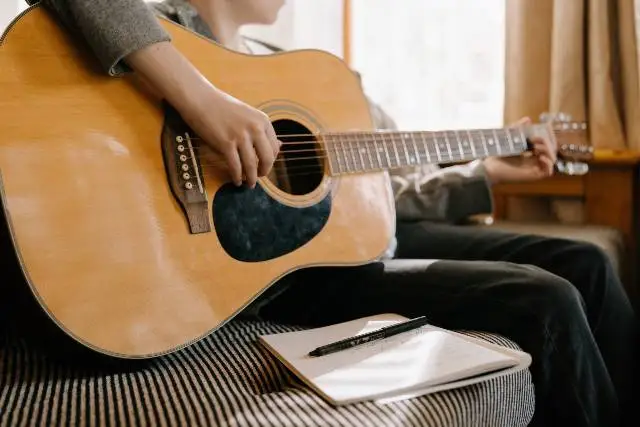
Lyric Writing Practice Is Essential
Ed Sheeran once compared songwriting to cleaning out a dirty tap. You have to go through the bad water before the clear stream of great songs inevitably comes through. This is a great analogy for songwriting and acknowledges the importance of practice.
You can only get better at a skill when you put consistent time and energy into it, and songwriting is no exception. Don't put pressure on yourself to write an amazing song right off the bat, but if you choose to write on a regular basis, it's bound to happen eventually.
There isn't one way to write lyrics, but hopefully, these tips make it easier for you to write your first complete composition. Just remember, practice makes perfect. With a little time and the help of these tips, you're bound to write amazing lyric lines in no time at all. Have fun and enjoy the writing process!


